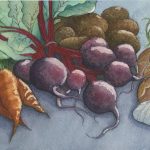Each day, Allison LaRussa shares with others her love of art and its powers of healing.
A lifelong artist and staple of the regional art scene, the Dunmore resident is a counselor at God’s Mountain Recovery Center, Waymart, a women’s drug and alcohol rehabilitation center, where she also teaches art therapy.
She knows firsthand how art can help with processing heavy feelings and trauma while working through addiction. LaRussa, who will celebrate nine years of sobriety in April, still uses her creativity to heal.
“Art has been my therapy throughout my recovery,” said LaRussa, who also is training to be a certified alcohol and drug counselor. “And to be able to share that with others and work with them to process heavy thoughts and feelings through art has been such a blessing. I am really grateful for the work I do.”
LaRussa grew up in a creative family where she was surrounded by artists and musicians. Self-expression was encouraged, and LaRussa found outlets through painting, drawing, writing and even dressing in colorful clothes.
In high school, LaRussa’s love of visual art deepened. She began to use art as a way to deal with heavy emotions.
“I started to realize how beneficial it was for anything I was going through,” said LaRussa, who to this day always has supplies to draw or paint with her. “It was good for my mental health, and it was good for working through anything painful. I started to realize that in high school (art) wasn’t just something you do – it’s something you’re able to use to explore your emotions and to help heal.”
Art therapy helps clients express their emotions, relieve stress, treat symptoms of anxiety and depression, and cope with recovery. LaRussa witnesses the impact art therapy has on her clients each day, even for those who are reluctant to take part in the program. She recalled one client who rolled their eyes at the mention of art therapy but later understood art’s healing power. There also was a client who broke down in tears and thanked LaRussa for the importance of art in their recovery process.
“I love seeing that transformation at the end or after they’re been so hesitant to take part in it,” she said. “They learn to just let themselves go and be in the moment to let all those feelings and emotions flow through them. It’s healing.”
LaRussa’s interaction with her clients inspired her to pay things forward in the first place. In the throes of addiction, LaRussa initially did not want to get sober. One day, her family basically pushed her into the car and drove her to rehab. Once in treatment, she realized how badly she wanted and needed to get clean. She feels “beyond grateful” to her family for what they did and believes that’s why it’s so important for people in recovery to have a support system.
Working with others also helps to keep LaRussa accountable in her own sobriety.
“It’s very hard to stop on your own,” she said. “When you’re using (drugs or alcohol), it’s such chaos, and it just consumes you, and you’re kind of just reacting. Having this network of support is helpful because you need someone else to hold you accountable. You might have some moments here and there, but you really just don’t have the mental clarity to see what you’re in and where you are when you’re using substances.”
Her two worlds collided when she was working at Just Believe Recovery Center, Carbondale, and the facility unveiled an art therapy program. LaRussa saw the transformations in her clients, and many chose to stay in treatment longer. LaRussa began working at God’s Mountain teaching art therapy part-time last July before it offered her a full-time position.
God’s Mountain’s mission inspires her, as it specifically offers programs and resources for women. Women in recovery have different needs than men since they have different biological and cultural roles, and LaRussa said providing gender-specific treatment not only addresses those unique needs but also gives women a safe, supportive environment in which to heal.
“I believe it is important and vital for women to feel safe, as the majority of them have experienced extensive trauma from men,” LaRussa said, adding multiple clients have told her this. “In a facility where there are only women, they have the ability to trust and feel comfortable in relating to other women, opposed to a coed facility.”
In her spare time, LaRussa remains a dedicated part of the region’s art scene. She’s participated in the AFA Gallery Holiday Art Auction and almost every First Friday Art Walk in Scranton. She also organized her own events with friends or supported fellow artists by showing up to theirs.
“It’s necessary for any community to have art, to have music, to have forms of self-expression. It’s so great to have those opportunities,” she said. “To see First Friday grow from just a few places five or six years ago to being everywhere, all over downtown, it’s amazing for the city.”
LaRussa uses her platform to advocate for mental health and addiction, as she felt the most comfortable about sharing the truth about her addiction when others were open and honest about their own journeys. She often urges those struggling to reach out for help and offers her support.
Mental health struggles and addiction can be lonely and isolating, and even more so during the pandemic. LaRussa hopes to reach as many people as she can and show them not only that they’re not alone but also that life in recovery is possible.
“We have to speak up. Even if it’s to get help for yourself, you don’t know who you might help by sharing your story,” she said. “When I was going through it, I thought I was the only one. The most important thing we can do right now is support each other, especially through these times.”
Meet Allison LaRussa
At home: Lives in Dunmore
At work: Counselor and art therapy teacher at God’s Mountain Recovery Center, Waymart
Inspirations: Mountaintops, self-expression, warm sunsets, the light and passion that fills someone’s eyes, vulnerability, the female body, the ocean, jazz music, sunflowers, long car rides, travel and lavender
Aspirations: To teach art in Thailand, to own a small shop with holistic treatments and therapies, and to end all stigmas attached to mental health and addiction
Diversions: Yoga, poetry, reading and hiking
Aversions: “The things I dislike are often something I learn from and need to evolve out of,” she said.
Quote: “You are loved just for being who you are, just for existing. You don’t have to earn it. Your shortcomings, your lack of self-esteem, physical perfection, or social and economic success – none of that matters. No one can take this love away from you, and it will always be here.” – Ram Dass

Gia Mazur is an award-winning staff writer and beauty obsessive who joined The Times-Tribune’s Lifestyles department in 2015. She’s a product enthusiast who can’t live without an eyelash curler. A proud Virgo, Charlotte Tilbury Matte Revolution Lipstick in Pillow Talk is her go-to. Contact: gmazur@timesshamrock.com; 570-348-9127; @gmazurTT




